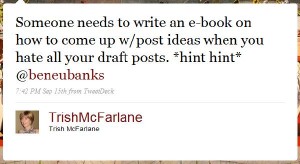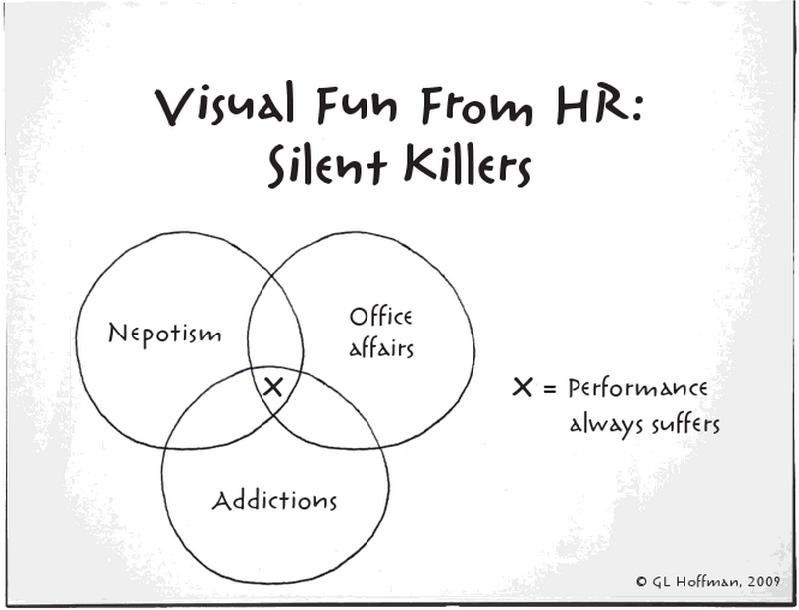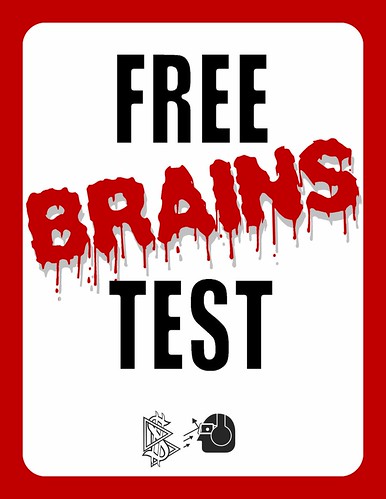 This isn\’t going to appeal to everyone, but I\’m putting it out there just the same. I get questions often from my many blogging friends. They usually center on finding new ideas to write about and keeping the spark of creativity alive. Even though I\’m technically an HR newbie, I pride myself in creativity. I wrote a lot of fiction before I started writing the kind of stuff that I do now, and I\’ve always been able to cobble together a story from a single thought fragment. So here are some ideas for you to inspire your own creativity. If you\’re a blogger, you\’ll be using these ideas for that. If you\’re not, then they might help you with something else. Trying to solve a problem at work? #6 has helped me with that dozens of times. I\’ve also included these as a free PDF for your downloading pleasure! Put it up by your computer and check it when you\’re stuck. 20+ Ideas to Inspire Creativity
This isn\’t going to appeal to everyone, but I\’m putting it out there just the same. I get questions often from my many blogging friends. They usually center on finding new ideas to write about and keeping the spark of creativity alive. Even though I\’m technically an HR newbie, I pride myself in creativity. I wrote a lot of fiction before I started writing the kind of stuff that I do now, and I\’ve always been able to cobble together a story from a single thought fragment. So here are some ideas for you to inspire your own creativity. If you\’re a blogger, you\’ll be using these ideas for that. If you\’re not, then they might help you with something else. Trying to solve a problem at work? #6 has helped me with that dozens of times. I\’ve also included these as a free PDF for your downloading pleasure! Put it up by your computer and check it when you\’re stuck. 20+ Ideas to Inspire Creativity
1. Take an old post and explore it from a different angle.
2. What do you read? Watch? Listen to? Enjoy? Each is a source of inspiration!
3. Open your RSS reader. Find a post you starred/enjoyed. Write a corollary or a counterpoint.
4. Use Google Alerts to show you news on a given topic.
5. Use Google Trends to find something “hot” to write about.
6. Turn off the radio in the car. You’d be surprised what happens when you don’t have music drowning out your “voice.”
7. Make a funny top 10 list.
8. Find a calendar of holidays and pick one to write about.
9. Find a quote that hits you a particular way and expand it into a paragraph or two.
10. Take a well-known phrase and apply it to your blog’s focus to develop a topic.
11. Review an item that you’ve used recently (book, movie, service, etc.)
12. Take two or more blog posts from other bloggers and tie them together with some of your own thoughts.
13. Predict something. It can be funny or serious, but it should stimulate readers.
14. Take an opposing stance to your normal ideas and try to make it convincing.
15. Force yourself to come up with 25 ideas for something. Anything. Twenty four of them might be horrible, but one could be a gem! 50 is better.
16. Write from a different point of view. Maybe try to demonstrate the POV from the VP level, manager level, and entry level.
17. Find someone to talk with about your blog. It can give you ideas, get you motivated, and help you propel yourself to a new level.
18. Find a new place to write. Even if that means lying in the closet floor with a laptop (Hey, whatever works!).
19. Comment on other blogs and use that as the basis for a new post. Similar to #3, but you give the other blogger a little comment love as well.
20. Go back and pick one of your first dozen posts to update.
21. Save your drafts. Even if it’s not looking like a good post, you never know when inspiration will strike and help you turn that puppy around.
22. Have a conversation in person with someone. Let that stimulate your brain. Quote the person in the post (people love that!).
23. Revisit your blog’s purpose and what you want to accomplish. Just refreshing yourself on that should give you some ideas, especially if you can think back to why you started it in the first place.




 hile that sounds like a great idea for everyone to follow, research indicates that half of Americans can’t identify a single person who fits that bill.
hile that sounds like a great idea for everyone to follow, research indicates that half of Americans can’t identify a single person who fits that bill. I keep a running log. I\’m not great about it, but I can still give you a fairly approximate average of my monthly mileage, and I can even remember some of the more memorable workouts (like the one on New Year\’s Eve in 2006 when I ran 7 miles in twenty degree weather while my family prepared for a party). Anyway, that running log helps me in multiple ways, and I think you should have one, too. Even if you\’re not a runner, it helps to chart your progress and make note of milestones. What if you used a log at work to keep up with your accomplishments?
I keep a running log. I\’m not great about it, but I can still give you a fairly approximate average of my monthly mileage, and I can even remember some of the more memorable workouts (like the one on New Year\’s Eve in 2006 when I ran 7 miles in twenty degree weather while my family prepared for a party). Anyway, that running log helps me in multiple ways, and I think you should have one, too. Even if you\’re not a runner, it helps to chart your progress and make note of milestones. What if you used a log at work to keep up with your accomplishments?

 For his first job fair appearance, I gave my friend Bill some advice that I felt would help him to have meaningful conversations with the recruiters. While he wondered about a tiny resume tweak, the type of paper to print on, and other minor details, I got him to focus on an overall strategy. Instead of walking around and tossing resumes onto the table for the 70+ employers present, I told him to do a bit of research and find 10-15 of the companies that he would enjoy working for. Then, I made him research each of those organizations, at least on the surface level, so that he could speak intelligently with the recruiters that represented each company. That, I told him, would make a much bigger difference than any other little changes he wanted to try.
For his first job fair appearance, I gave my friend Bill some advice that I felt would help him to have meaningful conversations with the recruiters. While he wondered about a tiny resume tweak, the type of paper to print on, and other minor details, I got him to focus on an overall strategy. Instead of walking around and tossing resumes onto the table for the 70+ employers present, I told him to do a bit of research and find 10-15 of the companies that he would enjoy working for. Then, I made him research each of those organizations, at least on the surface level, so that he could speak intelligently with the recruiters that represented each company. That, I told him, would make a much bigger difference than any other little changes he wanted to try.